- White-label Construction Bidding Software: Hit or a Miss?
- Factors Affecting the White-Label Construction Bidding Software Development Cost
- Software Complexity
- Level of Customization
- Development Team Location
- Integration Requirements
- Compliance Requirements
- Ongoing Maintenance and Support
- Scalability
- Essential Features to Add during White-label Construction Bidding Software Development
- Advanced Technologies Businesses Can Integrate in a Construction Bidding Software
- Key Steps to Implementing a White-Label Construction Bidding Software
- 1. Define Your Requirements
- 2. Choose the Right Development Partner
- 3. Focus on User Experience
- 4. Ensure Scalability and Integration
- 5. Implement Robust Security Measures
- 6. Plan for Ongoing Maintenance and Updates
- 7. Marketing and Branding
- Why Appinventiv is the Reliable Partner for Developing White-Label Construction Bidding Software
- FAQs
As the construction industry embraces digital transformation, the demand for efficient, scalable solutions is at an all-time high. Now, white-label construction bidding software that allows businesses to brand and customize advanced bidding tools as their own is the ultimate game-changer in this scenario. This solution enhances efficiency and reshapes how construction bids are managed and executed, providing a seamless, customizable platform that stands as a cornerstone for modern construction operations.
In addition to elevating the brand’s overall identity, a white-label construction bidding platform acts as a branded application that doesn’t require a hefty investment in building the technology from scratch.
For businesses looking to enter the construction tech market, white-label software development offers a remarkable opportunity. By building a white-label construction bidding solution, you can get a customizable tool that can be tailored according to the specific needs of any construction business.
Now, understanding the development and deployment of such platforms is crucial for leveraging this growing demand and establishing a strong foothold in the digital construction landscape.
To give you a rough idea, the overall construction bidding software development cost can vary from $35,000 to $200,000. Multiple factors can impact the cost of building such a platform, including the platform’s complexity, location of the hired software development team, features to be integrated in the software, and the depth of customization required.
In this blog, we will explore the various cost factors involved in developing white-label construction bidding software. We will also help you understand how investing in this technology can not only streamline construction bidding processes but also significantly enhance your brand’s value. So, let’s dive right into the details.
White-label Construction Bidding Software: Hit or a Miss?
According to a Statista report, the overall market for Construction and Design Software is expected to reach a valuation of $11.75 billion by 2029. The expanding market for construction technology is a clear indicator that major businesses are aggressively investing in digital tools to streamline their operations.
As the market for construction software is projected to grow significantly, embracing white-label solutions has become a strategic imperative for businesses aiming to supply these tools to the construction industry. White-label construction bidding software not only reduces development time and cost but also offers great flexibility for customization, enhancing your agility to meet diverse client demands.
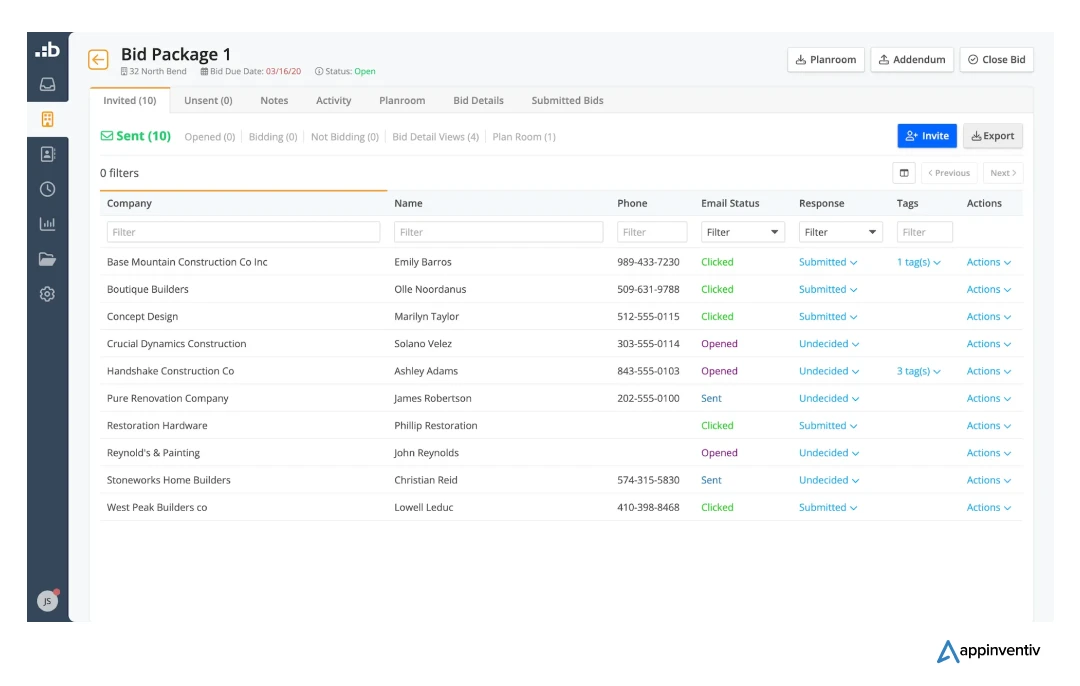
Investing in a white-label construction bidding software provides a dual advantage to your business. Firstly, it serves as an ideal tool for branding, allowing you to offer a high-tech solution under your own brand, which elevates your market presence and credibility among end users.
Secondly, it dramatically improves operational efficiencies, enabling your clients to manage bids more effectively, track project progress in real time, and optimize resource allocation. This combination of branding and operational excellence not only attracts more clients to your platform but also retains them by delivering consistent value.
Furthermore, the investment in white-label technology is seen not just as a cost, but as a strategic asset that can yield substantial returns. Businesses that deploy these solutions can expect improvements in bid precision, faster turnaround times, and a better alignment of project objectives with business strategies. Given these benefits of construction bidding software development, it is undeniably a “hit” for businesses aiming to stand out in the crowded construction industry.
Factors Affecting the White-Label Construction Bidding Software Development Cost
A variety of factors can influence the cost of developing a white-label construction bidding software, each contributing to the final investment required. Understanding these factors is crucial for any business looking to invest in this transformative technology.
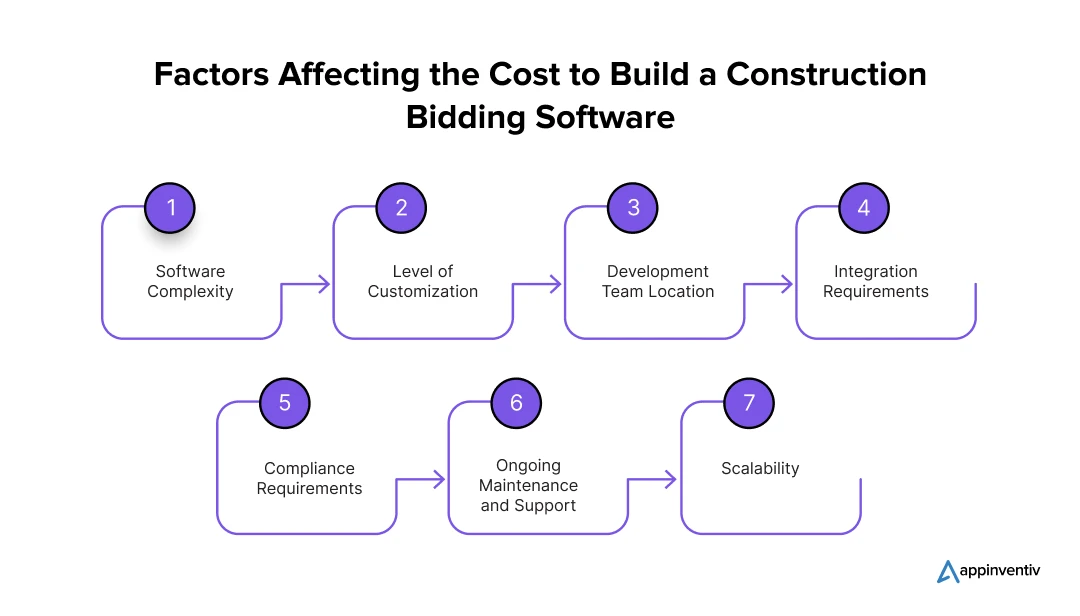
Software Complexity
The complexity of the software plays a pivotal role in determining the online construction bidding software development cost. More complex platforms with advanced features such as AI-based analytics, integrated CRMs, and sophisticated reporting tools will require more resources and, therefore, entail higher development costs.
Level of Customization
The extent to which the software needs to be customized also affects the price. Tailoring the platform to fit specific branding requirements and adding unique features that align with a company’s operational processes can increase the development effort and cost.
Development Team Location
The geographic location of the software development team significantly impacts the cost to develop construction bidding software. For instance, the hourly rate of development in countries like the UK or the US is usually higher than areas like Asia. Businesses looking to get robust software at an optimized cost while not compromising on the quality or compliances the software needs to adhere to are advised to outsource with a dedicated firm in regions like India. Their experts have hands-on expertise in the field while also strictly adhering to regulatory compliances.
| Region | Hourly Rates of Development |
|---|---|
| UAE | $60-$65 |
| US | $95-$100 |
| Western Europe | $80-$90 |
| Australia | $70-$90 |
| Eastern Europe | $50-$55 |
| Asia | $25-$40 |
Integration Requirements
Integrating the bidding software with existing systems such as ERP or project management tools can be complex and ultimately affect the white-label construction bidding software development cost. The more integrations required, the higher the construction bid management software development costs as additional time and expertise is needed to ensure seamless functionality.
Compliance Requirements
Ensuring that the software adheres to industry standards and regulations for data security can also add to the overall cost to develop construction bidding software. Compliance with standards like GDPR in Europe or similar regulations in other jurisdictions is essential but can be resource-intensive.
Ongoing Maintenance and Support
The cost of ongoing maintenance and support is an important consideration that businesses must keep in mind. Regular updates, bug fixes, and customer support services are necessary to keep the software running smoothly and securely, contributing to the overall lifecycle costs.
Scalability
Planning for future growth in user numbers, data volume, and transactional demand can impact the software’s initial cost. Ensuring the software can scale effectively may require more advanced architecture and cloud services from the start.
Now that you have looked into the cost to develop construction bidding software, let’s move ahead and look at the multiple features that a white-label construction bidding software should include.
[Also Read: How Much Does It Cost to Build a Construction Management Software Like Procore?]
Essential Features to Add during White-label Construction Bidding Software Development
White-label construction bidding software can be equipped with a range of features designed to streamline the bidding process, enhance project management, and improve client engagement. Here are some key features that are commonly included during construction bidding software development:
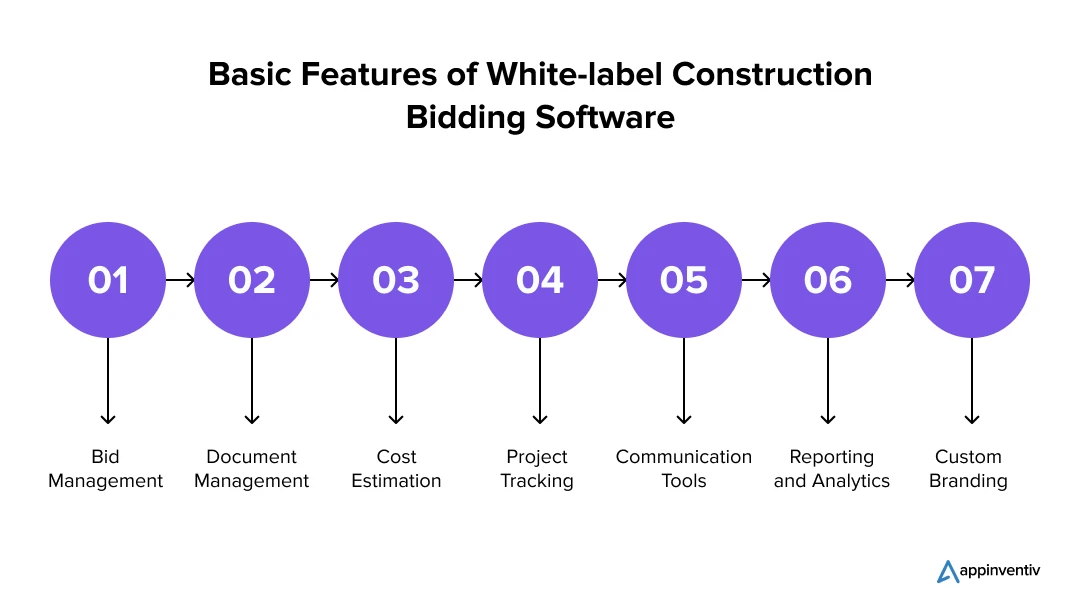
Bid Management
This core feature allows businesses to efficiently create, send, and manage bids. It includes tools for automating bid invites, tracking bid statuses, and analyzing bid responses.
Document Management
This feature acts as a centralized document repository that helps users store, manage, and share project-related documents and drawings. It ensures that all team members have access to the latest information.
Cost Estimation
Automated tools for estimating costs help businesses quickly generate accurate bids based on materials, labor, and other expenses.
Project Tracking
Real-time tracking features allow for monitoring project progress against timelines and budgets, facilitating better project control and management.
Communication Tools
These integrated communication features support seamless interactions between contractors, suppliers, and clients, enhancing collaboration and transparency.
Reporting and Analytics
Advanced reporting features provide insights into bidding trends, project performance, and financial forecasts. This helps businesses make informed decisions.
Custom Branding
The ability to customize the interface and functionality to match the branding of the business enhances the professional appearance and user experience.
These basic features can help you leverage the benefits of construction bidding software while enhancing overall project efficiency, improving accuracy in cost estimations, and streamlining communication among all stakeholders involved in the bidding process.
Advanced Technologies Businesses Can Integrate in a Construction Bidding Software
To further enhance the capabilities of white-label construction bidding software, businesses can integrate advanced features that leverage cutting-edge technologies. Let’s look at them in detail below:
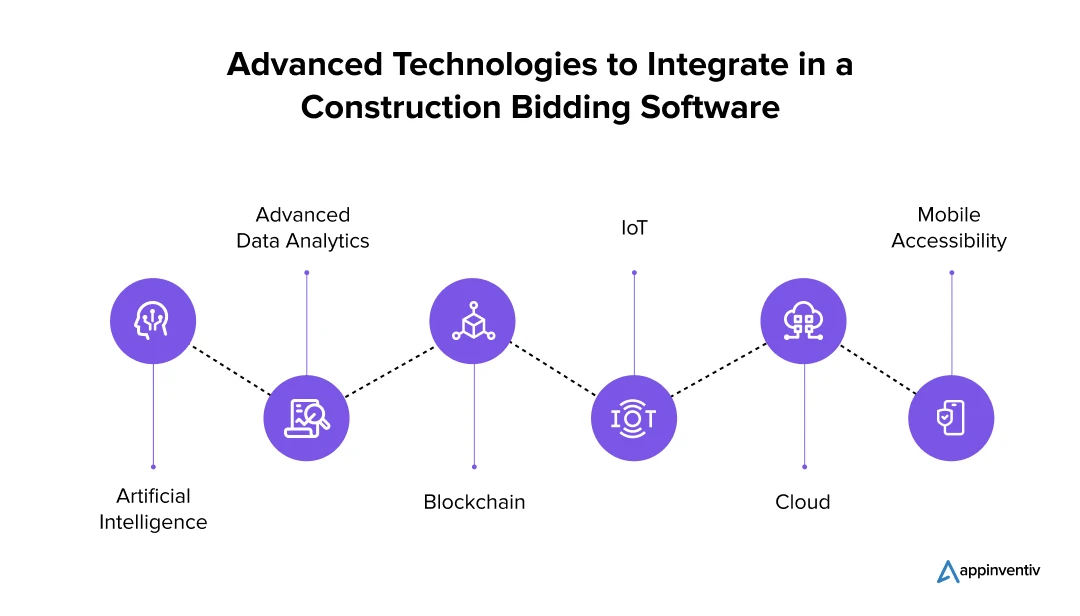
Artificial Intelligence
AI can be used to predict project outcomes, optimize bid pricing, and provide intelligent recommendations based on historical data.
[Also Read: AI in Construction – How Artificial Intelligence is Paving the Way for Smart Construction]
Advanced-Data Analytics
Analytics capabilities can help businesses perform more precise risk assessment and management. This helps ensure better control over projects and their uncertainties.
Blockchain
Incorporating blockchain can enhance security and transparency in transactions and contracts, building trust among all parties involved.
IoT
IoT devices can be connected to the software to monitor construction sites in real time, tracking equipment usage and worker productivity.
Cloud
Cloud technology can be seamlessly integrated into white-label construction bidding software to enhance data accessibility and storage solutions. By utilizing the cloud, businesses can ensure that all stakeholders have real-time access to necessary information, regardless of their location.
Mobile Accessibility
Developing an app on the same can also allow stakeholders to access information and make decisions on the go, increasing overall responsiveness and efficiency.
These advanced technologies integrated during the construction bidding and estimating software development process can significantly help businesses remain at the forefront of the digital transformation. Businesses must also understand that these integrations can also affect the overall white-label construction bidding software development costs but are vital for the success of the software.
Key Steps to Implementing a White-Label Construction Bidding Software
Adopting white-label construction bidding software offers an easy way to enhance your business capabilities without the complexities of developing a solution from scratch. Here are the essential steps of white-label construction bidding and estimating software development and implementation, tailored to your company’s specific needs.
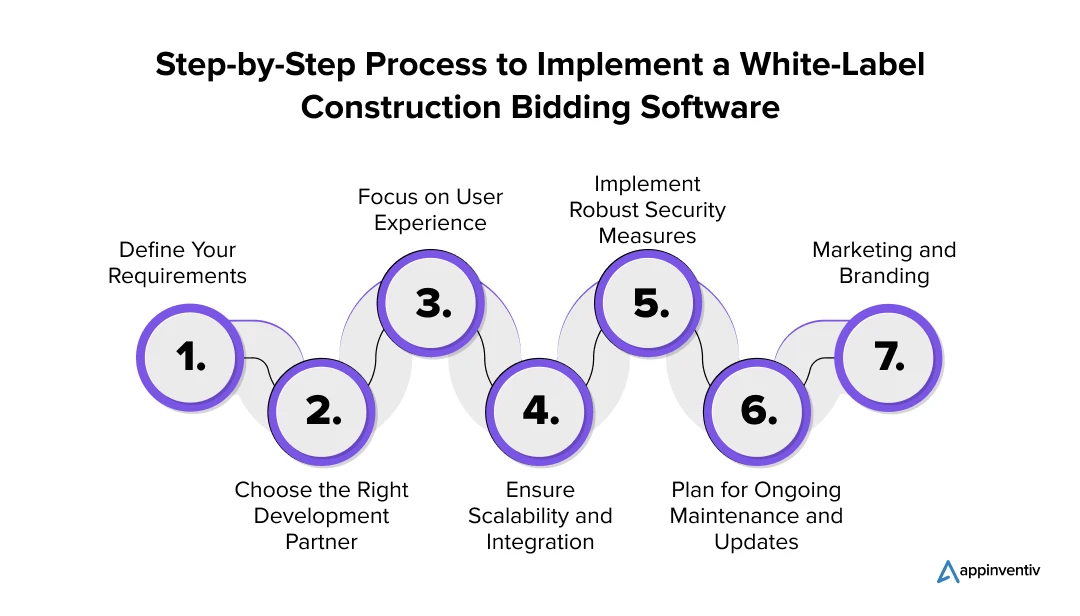
1. Define Your Requirements
Start by precisely defining what you need from the software, including necessary features, customization level, and how it will integrate with your current systems. It is vital to clearly understand your requirements so as to streamline the customization process.
2. Choose the Right Development Partner
Selecting the right development firm is a crucial decision that can also impact the overall cost of the construction bidding software development process. You need a provider that offers a robust white-label solution with proven expertise in the construction industry. Their ability to provide a customizable and scalable platform that fits your business model is essential.
3. Focus on User Experience
It’s important that the software is easy to use with a clear and simple interface. This makes it easier for your clients to learn and use the software effectively, leading to quicker adoption and greater satisfaction. Good user experience also involves making sure users can navigate the software smoothly and provide feedback easily. This feedback can help make the software even better, ensuring it meets your client’s needs well.
4. Ensure Scalability and Integration
Choose a software solution designed for easy scaling and integration. It should seamlessly integrate with the tools your business already uses, like ERP systems and CRM platforms, to enhance functionality without disrupting existing workflows.
5. Implement Robust Security Measures
Security is paramount, especially when businesses are handling sensitive construction bidding information. Ensure the software complies with industry-standard security protocols and data protection regulations to safeguard user data effectively.
6. Plan for Ongoing Maintenance and Updates
Work with your development partner to establish a maintenance schedule that keeps the software up to date-and running smoothly. Regular updates will ensure compatibility with evolving technology and continuous improvement based on user feedback. It is vital to understand that ensuring ongoing maintenance is one of the vital factors that can impact the overall cost to develop construction bidding software.
7. Marketing and Branding
Since the software is designed to be rebranded, make sure it includes flexible branding options that allow you and your clients to easily apply your own brand identity. This helps in maintaining a consistent brand experience across your digital assets.
Why Appinventiv is the Reliable Partner for Developing White-Label Construction Bidding Software
Appinventiv excels in white-label software development and specializes in delivering custom solutions for the construction industry. Our approach is powered by deep industry knowledge and advanced technological expertise. This enables us to build white-label construction bidding software that perfectly aligns with your business’s unique branding and operational needs.
Our process begins with a thorough understanding of your specific requirements. We recognize that each construction company has distinct challenges and goals, so we focus on creating customized solutions rather than adapting generic templates. This allows us to integrate unique features in your construction estimating software such as AI-driven analytics, IoT capabilities, and seamless mobile experiences, all designed to enhance efficiency and streamline your operations.
As a dedicated construction software development company, we place a strong emphasis on scalability and security, which are essential for any online construction bidding software. This ensures that as your business grows, your software can efficiently handle an increasing load without compromising performance or security.
Get in touch with us to partner with a team that is dedicated to delivering excellence and driving value.
FAQs
Q. How much does it cost to develop construction bidding software?
A. The online construction bidding software development cost can vary widely depending on factors like complexity, customization, and the chosen features. To give you a brief idea, the overall budget can range from $35,000 to $200,000. The final cost will depend on whether you opt for a fully custom solution or modify a white-label product to fit your needs.
Q. How long does it take to develop construction bidding software?
A. The time it takes to develop construction estimating software or bidding software can vary depending on the overall complexity of the software. For instance, simple software with minimal features can take around 6 to 7 months, on average. On the other hand, complex construction bidding or estimating software with extensive features that have been integrated with advanced technologies might take around 12 months to complete. A dedicated software development firm with expertise in the same can help you offer a sound estimate on the expected development timeline.
Q. Custom construction bidding software or white-label construction bidding software? What should a construction company choose?
A. Choosing between custom and white-label construction bidding software depends on your specific business needs, budget, and timeline. Custom software allows for full customization but is more expensive and takes longer to develop. White-label software, on the other hand, is generally more cost-effective and quicker to deploy but might not meet all specific needs as closely as a custom solution.


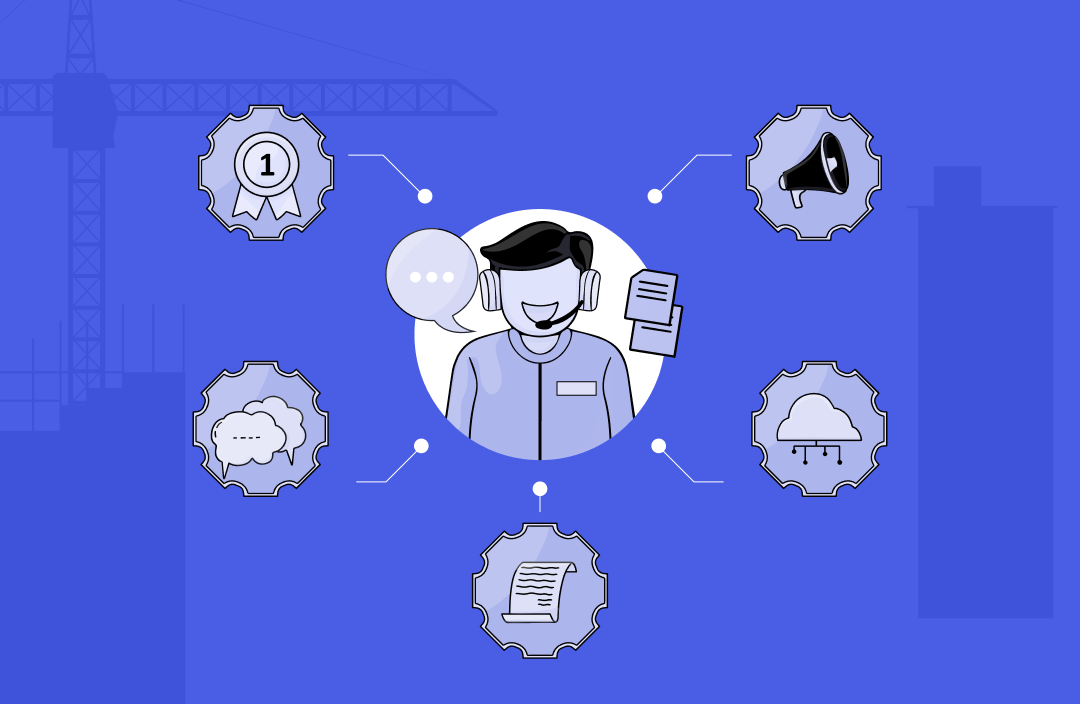
Construction CRM Integration and Implementation – Benefits, Process, Costs
Efficiency is everything when it comes to the construction sector. Factors like project cost overruns, late delivery, mismanagement of resources, or poor and confusing communication from clients may lead to derailment of the projects at a significant loss. Traditional methods have failed to meet the challenges of tighter timelines and greater complexity that modern construction…

How Much Does it Cost to Build a White Label Construction Accounting Software?
By 2050, Autodesk predicts cranking out around 13,000 new buildings every single day to keep up with a massive urban population of 10 billion people. The need for new housing, schools, and hospitals is a big part of the puzzle—but it’s just the tip of the iceberg. The real hustle? Managing finances. Tracking expenses, processing…

10 Smart Building Technologies Revolutionizing Facility Management
Managing buildings has come a long way from simply ensuring the lights work and the heating is on. Today, technology is changing how facilities are run, making operations smoother, more energy-efficient, and responsive to the needs of occupants. From systems that automatically adjust lighting and temperature to maintenance that can be predicted before issues arise,…


















